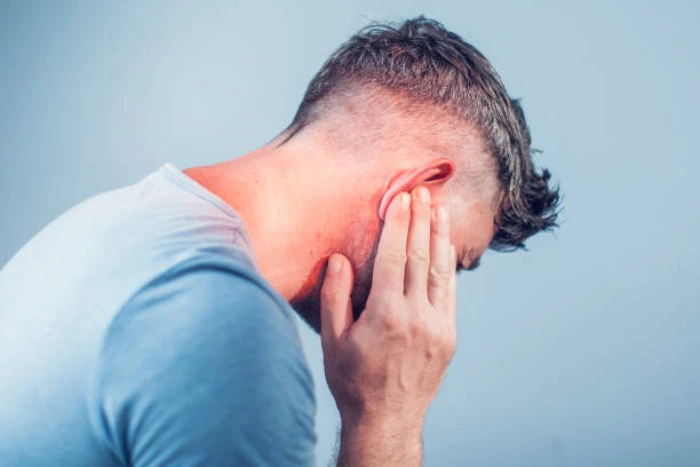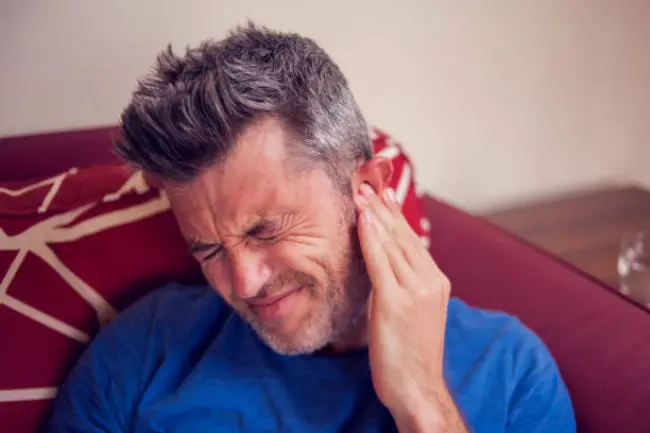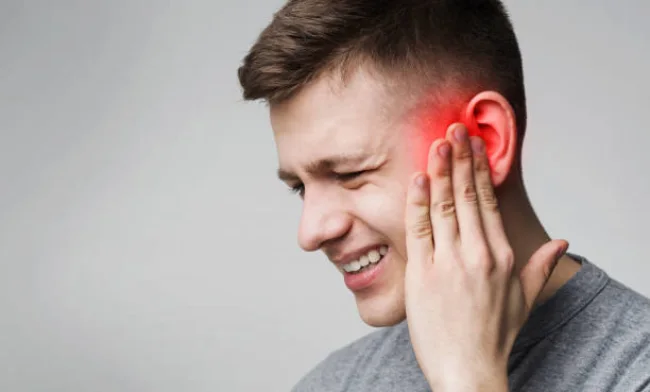Waking up with ear pain on the side you slept on can be an unpleasant experience. Whether it’s occasional discomfort or a chronic issue, it can be caused by different factors.
But, the most common cause of ear pain when sleeping on one side is the pressure of the pillow on your ear cartilage. Sleeping on one side for too long or using a too-firm pillow can irritate your ear cartilage and cause discomfort.
This discomfort can be caused by repeated pressure on the ear or the cartilage folding against the pillow. It’s essential to address this issue now before it gets worse. Let’s explore why your ear might hurt when you sleep on it and how you can prevent and treat this issue.
Why Does My Ear Hurt When I Sleep On It: 3 Causes
During sleep on one side, you may experience ear pain for several reasons:
Pressure on Ear Cartilage
The most common reason for ear pain during sleep is pressure on the ear cartilage caused by the pillow. When you sleep on one side for an extended period, the pillow can compress your ear cartilage, which leads to irritation and pain.
Also, sleeping on a firm pillow only heightens this pressure on your ear, causing more adverse effects.
Cartilage Folding Against Pillow
Apart from pressure, the cartilage folding over the pillow could also hurt your ear when you sleep on it. The cartilage can move and fold against the pillow as you move during sleep, leading to discomfort and pain. If you’re a restless sleeper, this can compound your discomfort, leading to a severe problem.
Risk of Chronic Problems
If left unaddressed, ear pain caused by sleeping on your ear can lead to chronic health problems. For instance, the recurrent irritation of your ear can lead to permanent damage to the cartilage or even infections.
Also, long-term inflammation of the ear cartilage can lead to a severe condition called chondritis. Therefore, addressing this issue before it becomes a chronic problem is necessary.
How long does this ear pain last?
Waking up with ear pain can not only be uncomfortable but also concerning. The length of time ear pain persists after sleeping on it can vary from person to person. Although it’s common for the pain to last up to three days, some individuals may need up to a week to heal entirely.
But, it’s important to note that if the pain persists for an extended period or comes with other symptoms such as hearing loss, dizziness, or fever, it’s essential to seek medical attention. Don’t ignore the pain; work to find the source and solution to get back to a comfortable and healthy way of life.
Does this ear pain go away naturally?
The good news is that ear pain caused by sleeping on it often gets better on its own or with home care. A warm compress to the affected ear can help alleviate pain and discomfort. Over-the-counter pain relievers like ibuprofen or acetaminophen can also help manage pain.
But, if the pain persists for longer than a few days, seeking medical attention is essential. The pain may be caused by an ear infection or another underlying medical condition that needs treatment. A doctor can diagnose the cause of the pain and recommend a course of treatment.
How do I stop my ears from hurting when I sleep?
Fortunately, several remedies can help alleviate ear pain while you sleep:
Hot or Cold Compress
The compress helps to alleviate the pain by reducing inflammation and swelling in the ear area. To use this remedy, warm a clean cloth under hot water or place it in a bowl of ice-cold water.
Next, wring out the excess water and gently place the cloth on the affected ear for about 20 minutes. Repeat the process daily until you feel relief.
Over-the-Counter (OTC) Pain Relievers
Over-the-counter pain relievers such as ibuprofen or acetaminophen can effectively remedy ear pain. These medicines work by reducing inflammation and pain in the ear area. Always follow the recommended dosage on the package and avoid taking these medications for prolonged periods without consulting a doctor.
Change in Sleep Position
Sometimes, the position you sleep in can pressure your ears, causing pain. Changing your sleep position can make a significant difference. For example, if you usually sleep on your side, try sleeping on your back instead. This position can help reduce pressure on your ear, reducing the pain you feel while sleeping.
How do I know if my ear pain is severe?
Some ear pain may be mild and easily manageable, while others can be more severe and require immediate medical attention. Here are signs that indicate your ear pain is serious:
Excessive Pain With or Without Fever
Experiencing pain in the ear is a common indication of an underlying ear problem. But severe ear pain is characterized by an intense and throbbing sensation that can persist for an extended period. This pain usually accompanies other symptoms, such as fever, headache, and chills.
Itching of the Ear or Ear Canal
While a mild itch in the ear may be nothing to worry about, severe itching in the ear canal usually indicates an underlying ear condition such as a fungal infection or eczema. This can lead to severe discomfort and inflammation; if left untreated, it can cause significant damage to the ear.
Loss of Hearing or Difficulty Hearing
Hearing loss or difficulty hearing is a severe symptom that should never be ignored. This can be caused by various factors, such as a perforated eardrum, earwax build-up, or even an ear infection.
If you experience sudden or gradual hearing loss, it’s crucial to seek out the services of an audiologist or an ear specialist.
Pus or Discharge from an Ear
Pus or discharge from the ear usually indicates an underlying ear infection, which can cause severe pain and discomfort. The presence of pus or discharge usually means the infection has progressed and requires immediate medical attention.
Other symptoms may include fever, headache, and nausea, and if left untreated, the infection can spread to other parts of the ear and cause further damage. Professional medical help is necessary to manage the symptoms and prevent further complications.
Sleep Better Tonight: Tackling the Problem of Unbearable Ear Pain
Ear pain can significantly disrupt sleep, making you tired and irritable throughout the day. Therefore, it is crucial to understand why your ear hurts when you sleep on it and take steps to stave off this problem.
Whether increasing your pillow’s softness, changing position often, or even considering sleeping on your back, taking care of your ear cartilage is necessary for continued good health.




